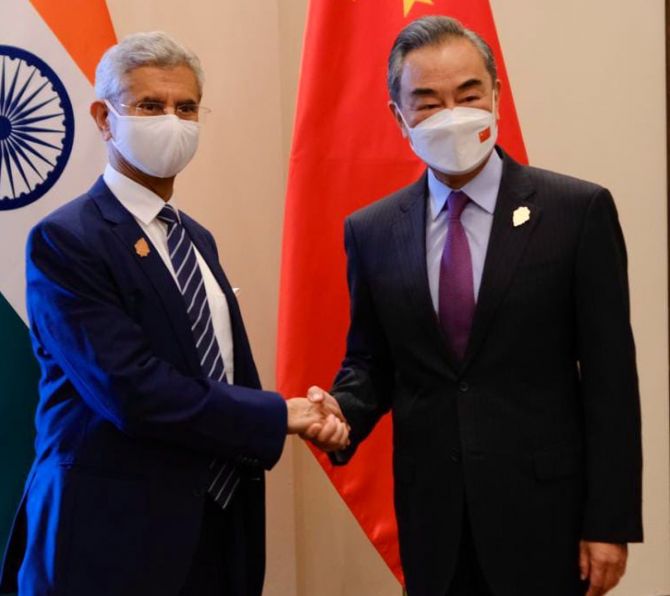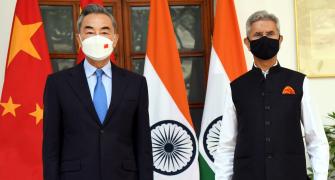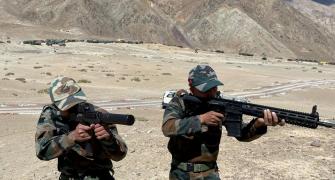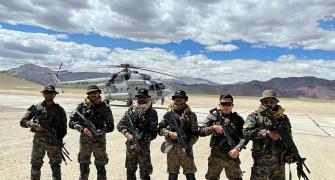India on Thursday pressed China for an early resolution of all the outstanding issues along the Line of Actual Control (LAC) in eastern Ladakh, with External Affairs Minister S Jaishankar conveying to his Chinese counterpart Wang Yi the need for completing the disengagement process from the remaining friction points in the region.
At a one-hour meeting in Bali on the sidelines of a conclave of foreign ministers of the G20 nations, Jaishankar told Wang that the relationship between the two countries should be based on "three mutuals" -- mutual respect, mutual sensitivity and mutual interests.

Jaishankar also reaffirmed the importance of "fully abiding" by the bilateral agreements and protocols, and the understandings reached between him and Wang during their previous conversations, according to the ministry of external affairs.
The talks took place nearly three-and-a-half months after Wang visited India.
"Began my day in Bali by meeting FM Wang Yi of China. Discussion lasted one hour. Focused on specific outstanding issues in our bilateral relationship pertaining to the border situation. Also spoke about other matters including students and flights," Jaishankar tweeted.
India has been pressing for quick disengagement of troops from all the remaining friction points in eastern Ladakh, insisting that peace and tranquillity along the border are prerequisite for progress in overall ties.
Jaishankar also discussed with Wang the vexed issue of the return of Indian students to China and the resumption of direct flights between the two countries.
On the discussions on the border row, the MEA said Jaishankar and Wang looked forward to the next round of senior commanders' meeting at an early date.
"The External Affairs Minister (EAM) called for an early resolution of all the outstanding issues along the LAC in Eastern Ladakh," the MEA said in a statement.
"Recalling the disengagement achieved in some friction areas, the external affairs minister reiterated the need to sustain the momentum to complete disengagement from all the remaining areas to restore peace and tranquillity in the border areas," it said.
The MEA further said that Jaishankar "reaffirmed the importance of fully abiding by bilateral agreements and protocols, and the understandings reached between the two ministers during their previous conversations".
"In this regard, both ministers affirmed that the military and diplomatic officials of the two sides should continue maintaining regular contact and looked forward to the next round of senior commanders' meeting at an early date," it said.
The MEA said Jaishankar also recalled his meeting with Wang Yi in Delhi in March and reviewed the progress of some key issues discussed then, including the return of students.
"The EAM stressed the need for expediting the process and facilitating the return of students on an early date," the MEA said.
Thousands of Indian students were unable to return to China for over two years due to Beijing's Covid-19 restrictions. India has been taking up the issue with China several times.
There have been discussions between the two sides on the resumption of direct flights but there has been no forward movement on the issue. The flight services were suspended due to the pandemic.
In another tweet, Jaishankar said: "Shared perspectives on the international situation and its impact on the G20 deliberations."
"The two ministers also exchanged perspectives on other regional and global developments. Foreign Minister Wang Yi appreciated India's support during China's BRICS chairship this year and assured China's support for India's upcoming G20 and SCO Presidency. They agreed to remain in touch," the MEA said.
In May, India and China held diplomatic talks on the border row and agreed to hold the next round of the Senior Commanders' meeting at an early date to achieve complete disengagement from all friction points in eastern Ladakh.
However, both sides are yet to decide on the next round of military talks.
The border standoff between the Indian and Chinese militaries erupted on May 5, 2020, following a violent clash in the Pangong lake areas.
The face-off escalated after the Galwan Valley clashes on June 15, 2020.
Both sides gradually enhanced their deployment by rushing in tens of thousands of soldiers as well as heavy weaponry.
As a result of a series of military and diplomatic talks, the two sides completed the disengagement process last year in the north and south banks of the Pangong lake and in the Gogra area.
Each side currently has around 50,000 to 60,000 troops along the LAC in the sensitive sector.









